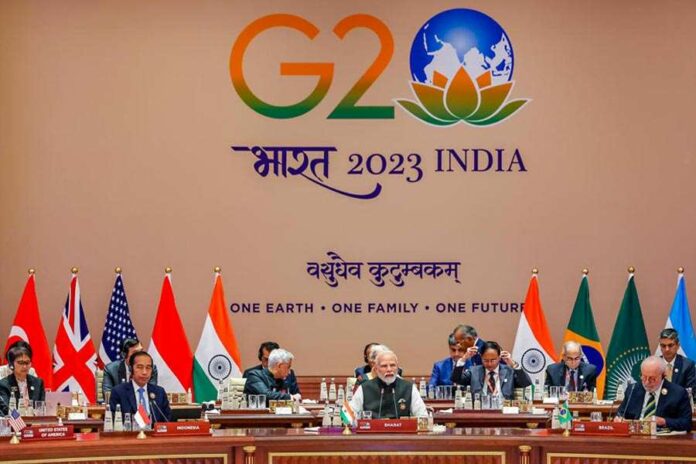The Group of Twenty (G20) was initially established in 1999 to promote international financial stability and economic cooperation. Over the years, its agenda has evolved to encompass a wider array of global challenges, including environmental issues. Climate change, in particular, has become a recurring theme in G20 discussions, reflecting the recognition that the world’s largest economies must take a leadership role in addressing the environmental crisis.
Outcome of G20 2023 – India’s Presidency
At the 2023 G20 summit in New Delhi, leaders from these major economies made significant commitments for 2030. These commitments encompass tripling global renewable energy capacity by that year and recognizing the imperative of phasing out unabated coal power.
Additionally, the G20 nations collectively embraced the goal of tripling global renewable energy capacity by 2030, emphasizing the importance of existing targets, policies, and efforts, while demonstrating similar ambition for zero and low-emission technologies, including abatement and removal technologies, tailored to individual national circumstances.
Technological Innovations Driving Environmental Solutions:
Renewable Energy Technologies: The transition to renewable energy sources, such as solar, wind, and hydropower, has gained momentum within the G20 countries. India, for instance, has made significant strides in solar energy production. The country’s renewable energy capacity is projected to grow to 280 GW by 2025, accounting for 37% of the total energy supply and 450 GW by 2030.
Global Biofuels Alliance: Another big takeaway of the declaration was the launch of the Global Biofuels Alliance (GBA). The GBA’s objectives include promoting international collaboration, developing robust biofuel markets, intensifying the use of sustainable biofuels in transportation, sharing policy lessons, and offering technical support for national biofuels programs.
Advancing Financial Inclusion: The G20 also embraced the voluntary and non-binding G20 Policy Recommendations for Advancing Financial Inclusion and Productivity Gains through Digital Public Infrastructure, recognizing the critical role played by digital public infrastructure in promoting financial inclusion for inclusive growth and sustainable development.
Precision Agriculture: In the agricultural sector, India’s adoption of precision farming techniques has led to increased crop yields and reduced resource consumption. The use of IoT sensors and data analytics is helping Indian farmers make informed decisions.
Artificial Intelligence (AI) and Big Data: India is harnessing AI and big data analytics for environmental monitoring and management. AI-based weather prediction systems, for instance, are helping mitigate the impact of natural disasters like cyclones and floods.
Global Digital Public Infrastructure Repository:
As outlined in the declaration, represents a significant step towards fostering international collaboration and knowledge sharing in the realm of digital public infrastructure.
This repository, envisioned by India, is essentially a virtual platform that will serve as a centralized hub where both G20 and non-G20 countries can voluntarily contribute and access open-source mechanisms. These mechanisms encompass a wide range of digital tools, technologies, and solutions aimed at enhancing various aspects of public infrastructure.
G20’s Role in Harnessing Web 3 for Environmental Solutions:
India’s strong presence in software development and IT services positions it as a valuable contributor to collaborative research and development efforts focused on harnessing the potential of Web 3 technologies for environmental solutions.
Within the G20, Indian policymakers have a crucial role in shaping proactive policy frameworks that promote the adoption of eco-friendly technologies while addressing India’s unique challenges.
Moreover, India has an opportunity to work alongside other G20 nations in establishing international standards for data sharing, blockchain applications, and AI ethics, fostering responsible and sustainable technology adoption on a global scale.
The Way Ahead:
With its vast population and diverse environmental challenges, India’s role within the G20 is pivotal in the quest for global environmental solutions. AI and Web3 hold the promise of not only transforming our approach to sustainability but also accelerating progress toward achieving the SDGs.
As these two technological titans join forces, we stand on the brink of a future where innovation safeguards our planet and secures a better world for generations to come.
With these technologies becoming increasingly integrated into India’s development agenda, the G20’s commitment to collaborative research, policy development, and international standards can pave the way for a sustainable future where technological progress is harnessed to protect the planet. By embracing these innovations and leveraging India’s expertise, the G20 can leave a lasting legacy of environmental stewardship for generations to come.



